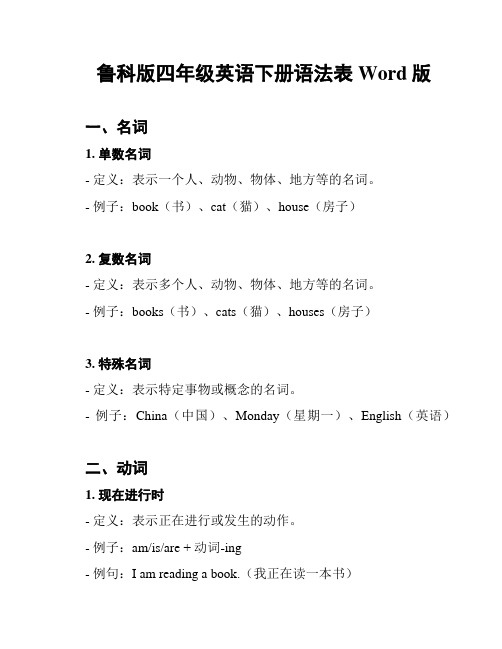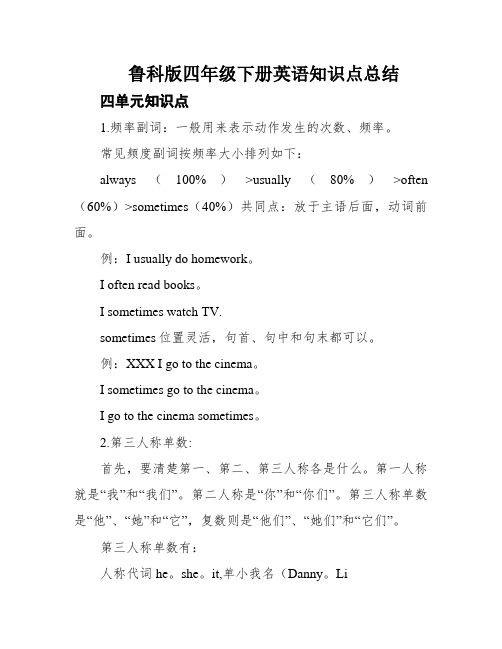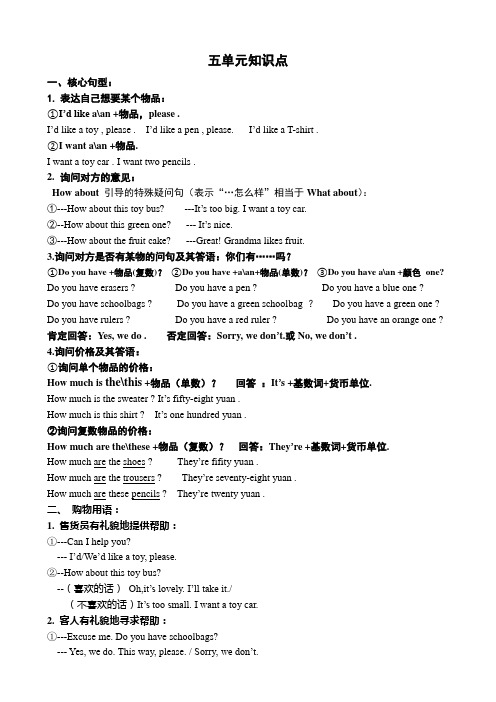最新鲁教版四年级下册英语知识点梳理
鲁科版四年级英语下册重点句子复习

鲁科版四年级英语下册重点句子复习-CAL-FENGHAI.-(YICAI)-Company One1Unit11、I'm from the Britain . 我来自英国。
2、Welcome to China! 欢迎来到中国!3、Where are you from? 你来自哪里?4、I'm from Canada. 我来自加拿大。
5、I'm from the U.S. 我来自美国。
6、I'm Mr Bean. 我是憨豆先生。
7、Where's she from? 她来自哪里?8、They're our new friends. 他们使我们的新朋友。
9、Where's he from? 他来自哪里?10、He's from Australia. 他来自澳大利亚。
11、She's from India. 她来自印度。
12、Is he from America? 他来自美国吗?13、He's from France. 他来自法国。
14、Her name's Mary. 她叫玛丽。
15、Where's Jim from? 吉姆来自哪里?16、Is Mike from Canada,too? 迈克也来自加拿大吗?17、He's from the U.S. 他来自美国。
18、I live in Beijing. 我住在北京。
19、Where do you live? 你住在哪里?20、I live in Ottawa. 我住在渥太华。
21、It's beautiful. 它很漂亮。
22、London is famous. 伦敦很有名。
23、I live in Washington D.C. 我住在华盛顿。
24、Is she from India? 她来自印度吗25、London is beautiful. 伦敦很漂亮。
鲁教版四年级英语知识点总结

四年级知识点总结Unit 1语音:j--/ / jump,juice,June,July w--/ / well,warm,winter,wearU--/ / music,menu,cute,computer词汇:(1)核心词汇:中国来自她;她的生活;居住(2)国家:加拿大美国英国澳大利亚印度法国城市:渥太华伦敦华盛顿市形容词:著名的句型:(1)你叫什么名字?我的名字叫吉姆。
(2)你来自哪里?我来自加拿大。
(3)你住在哪里?我住在渥太华。
(4)欢迎来到中国。
(5)伦敦是著名的。
(6)她来自哪里?她来自澳大利亚。
(7)他来自哪里?他来自伦敦。
(8)他来自美国吗?不,他不是。
他来自法国。
wh开头的疑问词:疑问代词:what 什么who 谁which 哪个whose 谁的疑问副词: when 什么时候where 哪里why 为什么Unit 2语音:y--/ / yes,your,year,yellow s--/ / his,please,these,Tuesdaye--/ / egg,get,bed,help词汇:动词:弄干净;擦干净洗;冲洗水;给…...浇水名词:鞋窗户衣服花家务劳动一餐(饭)盘子感叹词:美味的句型:(1)你会刷你的鞋吗?是的,我会。
(2)你会擦窗户吗?不,我不会,(3)让我们做家务劳动吧! (3)你正在做什么?我正在洗衣服。
(5)你正在做饭吗?是的。
我正在烹饪鸡肉。
(6)妈妈正在做什么?她正在洗盘子。
(7)我做不好。
(8)午饭准备好了。
语法:现在进行时be(am/is/are)+动词-ing 正在做...短语:做家务劳动刷我的鞋擦窗户擦地板洗衣服做饭烹饪鸡肉浇花洗盘子打扫厨房玩电脑游戏做面包Unit 3语音:c--/ /nice,rice,face,dance c--/ /cap,call,cold,come 词汇:动词:想要吃等;等待喝;饮名词:面条食物土豆汤西红柿分;分钟;片刻蛋糕;糕点水果香蕉比萨饼梨子其他:到外面;在外某物句型:(1)你(们)想要吃什么?我/我们想要吃饺子。
鲁科版四年级英语下册语法表Word版

鲁科版四年级英语下册语法表Word版一、名词1. 单数名词- 定义:表示一个人、动物、物体、地方等的名词。
- 例子:book(书)、cat(猫)、house(房子)2. 复数名词- 定义:表示多个人、动物、物体、地方等的名词。
- 例子:books(书)、cats(猫)、houses(房子)3. 特殊名词- 定义:表示特定事物或概念的名词。
- 例子:China(中国)、Monday(星期一)、English(英语)二、动词1. 现在进行时- 定义:表示正在进行或发生的动作。
- 例子:am/is/are + 动词-ing- 例句:I am reading a book.(我正在读一本书)2. 一般过去时- 定义:表示过去发生的动作或状态。
- 例子:动词过去式- 例句:He ate an apple.(他吃了一个苹果)3. 将来时- 定义:表示将来要发生的动作。
- 例子:will + 动词原形- 例句:We will go to the zoo tomorrow.(我们明天要去动物园)三、形容词1. 形容词的用法- 定义:用于描述名词的特征或性质。
- 例子:big(大)、small(小)、happy(快乐)2. 比较级和最高级- 定义:用于比较两个或多个事物的大小、程度等。
- 例子:比较级用于比较两者,最高级用于比较三者或三者以上。
- 例句:This book is bigger than that book.(这本书比那本书大)四、副词- 定义:用于修饰动词、形容词、其他副词等。
- 例子:quickly(快速地)、always(总是)、very(非常)以上是鲁科版四年级英语下册的语法表,希望对你的研究有帮助!。
最新鲁教版-四年级下册英语知识点

四年级下册英语知识点U1 Countries单词:China,from,her,live句子:1 Welcome to China.2 Where are you from? I’m from Britain.3 Where’s she\he from? She’s\He’s from India.4 Where do you live? I live in London.5 Is she from America? No, she isn’t.She’s from France.U2 Housework单词:wash,shoe,clean,window,clothes,water,flower,game句子:1 Let’s do housework.2 Can you clean the window? Yes, I can./No, I can’t.3 What are you doing? I’m watering the flowers.4 What’s she doing? She’s washing the dishes.5 Where’s dad? He’s in the kitchen.6 Are you playing computer games? No ,we aren’t.U3 Restaurant单词:want,eat,noodle,potato,soup,tomato,wait,minute,cake,fruit,banana句子:1 I’m hungry. It’s time for lunch.2 What do you want to eat? I want to eat jiaozi.3 What would you like? I’d like rice and potatoes.4 Would you like some soup? Yes, tomato soup, please.5 Would you like something to drink? Yes, I’d like some pear juice.6 Have some fruit, please. OK, I like bananas.U4 Weekend单词:visit,sometimes,cinema,take,listen句子:1 Have a nice weekend.2 What do you do at the weekend? I often take pictures. Sometimes I go t o the museum.3 What does your mother do at the weekend? She often goes shopping.4 Do you often take pictures? Yes, I do.5 Does he often play the violin? Yes, he does/ No, he doesn’t.U5 Shopping单词:toy,help,bus,car,fast,buy,how much,trousers句子:1 Can I help you? I’d like a toy, please.2 How about this toy bus ? It’s too big. I want a toy car.3 Excuse me. Do you have schoolbags? Yes, we do./ Sorry we don’t.4 How much is this shirt? It’s one hundred yuan. I’ll take it.5 How much are they? They’re fifty-eight yuan. Ok, we’ll take them.6 Have some fruit, please. OK, I like bananas.5 How much are they? They’re fifty-eight yuan. Ok, we’ll take them.U6 Travel单词:travel句子:1 Summer vacation is coming.2 Are you going to travel? Yes, I’m going to Mount Taishan.3 Where are you going ? I’m going to the Shaolin Temple.4 How are you going there? I’m going there by train.5 What are you going to do? I’m going to learn Kongfu。
鲁科版四年级下册英语知识点总结

鲁科版四年级下册英语知识点总结四单元知识点1.频率副词:一般用来表示动作发生的次数、频率。
常见频度副词按频率大小排列如下:always(100%)>usually(80%)>often (60%)>sometimes(40%)共同点:放于主语后面,动词前面。
例:I usually do homework。
I often read books。
I sometimes watch TV.sometimes位置灵活,句首、句中和句末都可以。
例:XXX I go to the cinema。
I sometimes go to the cinema。
I go to the cinema sometimes。
2.第三人称单数:首先,要清楚第一、第二、第三人称各是什么。
第一人称就是“我”和“我们”。
第二人称是“你”和“你们”。
第三人称单数是“他”、“她”和“它”,复数则是“他们”、“她们”和“它们”。
第三人称单数有:人称代词he。
she。
it,单小我名(Danny。
LiMing。
Tom。
My mum…)、单数可数名词(thecar)。
在普通目前时的句子中,当句子的主语为第三人称单数时,句子中的动词要相应地采用单数形式,即第三人称单数形式,也称“三单”或“单三”。
动词第三人称单数的变革划定规矩:1.大局部的动词,组成第三人称单数时,间接加-s。
如:read-reads,play-plays,listen-listens,take-takes,climb-climbs,clean-cleans。
write-writes。
cook-cooks。
2.当动词词尾是-s,x,ch,sh时,组成第三人称单数时,加-es。
如:watch-watches。
wash-washes。
3.动词词尾是-o的话,需要在词尾加-es构成第三人称单数。
如:do-does。
go-goes。
4.特殊情况,have的第三人称单数为has。
鲁科版四年级英语下册知识点总结2

五单元知识点一、核心句型:1.表达自己想要某个物品:①I’d like a\an +物品,please .I’d like a toy , please . I’d like a pen , please. I’d like a T-shirt .②I want a\an +物品.I want a toy car . I want two pencils .2.询问对方的意见:How about 引导的特殊疑问句(表示“…怎么样”相当于What about):①---How about this toy bus? ---It’s too big. I want a toy car.②--How about this green one? --- It’s nice.③---How about the fruit cake? ---Great! Grandma likes fruit.3.询问对方是否有某物的问句及其答语:你们有……吗?①Do you have +物品(复数)?②Do you have +a\an+物品(单数)?③Do you have a\an +颜色one? Do you have erasers ? Do you have a pen ? Do you have a blue one ?Do you have schoolbags ? Do you have a green schoolbag ?Do you have a green one ? Do you have rulers ? Do you have a red ruler ? Do you have an orange one ? 肯定回答:Yes, we do . 否定回答:Sorry, we don’t.或No, we don’t .4.询问价格及其答语:①询问单个物品的价格:How much is the\this +物品(单数)?回答:It’s +基数词+货币单位.How much is the sweater ? It’s fifty-eight yuan .How much is this shirt ? It’s one hundred yuan .②询问复数物品的价格:How much are the\these +物品(复数)?回答:They’re +基数词+货币单位.How much are the shoes ? They’re fifity yuan .How much are the trousers ? They’re seventy-eight yuan .How much are these pencils ? They’re twenty yuan .二、购物用语:1. 售货员有礼貌地提供帮助:①---Can I help you?--- I’d/We’d like a toy, please.②--How about this toy bus?--(喜欢的话)Oh,it’s lovely. I’ll take it./(不喜欢的话)It’s too small. I want a toy car.2. 客人有礼貌地寻求帮助:①---Excuse me. Do you have schoolbags?--- Yes, we do. This way, please. / Sorry, we don’t.② ---Excuse me. How much is this shirt?---It’s one hundred yua n.③---Excuse me. How much are the trousers?--They’re fifty-eight yuan.--OK! We’ll take them.三、难点句子和单词:1.May I have a toy ?may+动词原形,表示“许可、准许”,与“can”同义,可以互换使用。
最新鲁教版四年级下册英语知识点梳理
鲁教版四年级下册英语知识点梳理Name:____________ Class:____________Unit 1 主题:Countries国家一、重点单词:1、七个国家:China(中国)、Canada(加拿大)、the U.S.(美国)、Britain(英国)、Australia(澳大利亚)、India(印度)、France(法国)*每个单词首字母大写;每个国家的标志性建筑或国旗?2:三个城市:Ottawa(渥太华--加拿大)、London(伦敦--英国)、Washington D.C.(华盛顿--美国)*每个单词首字母大写,要记住是属于哪个国家。
3:其他单词:from(来自)、her(她的)、live(V.生活;居住)、famous(著名的)二、重点句型:1.询问国籍:①Where are you from? - I’ m from...②Where’ s she/ he/ 人名from? - She’ s /He’ s from...③Is she/ he/ 人名from the...? -Yes, she/he is. /No, she/he isn’ t.2.询问居住地:Where do you live? - I live in...3.其他句型Unit 2 主题:Housework家务劳动一、重点单词:1、动词:clean(弄干净,擦干净)、wash(洗,冲洗)、water(给...浇水)2、名词:housework(家务劳动)、shoe(鞋)、window(窗户)、clothes (衣服)、meal(一餐饭)、water(水)、flower(花)、dish(盘子)3、形容词:yum(美味的)二、重点短语:do housework(做家务)、clean your shoes (擦干净你的鞋子)、clean the windows(擦干净窗户)、clean the floor(擦干净地板)、clean the kitchen(清理厨房)、do it well (做得好)、wash clothes (洗衣服)、wash the dishes (洗盘子)、in the kitchen(在厨房里)、cook the meal (做一餐饭)、cook the chicken(做鸡)、water the flower(浇花)、(玩电脑游戏)、have a look(看一下)、make bread(制作面包)三、重点句型:1. 询问能力:①Can you +V...? Yes, I can. / No. I can’ t. ②I can +V... ③ I can’ t +V2. 询问某人正在做什么事:①What are you doing? -I’ m +Ving...②What’ s +人名+doing? - She’ s /He’ s +Ving...③Are you +Ving...? -Yes, we are./ No, we aren’ t.3. 询问某人在哪里:Where’ s +人名?Unit 3 主题:Restaurant餐馆一、重点单词:1.食物:food(食物)noodle(面条)potato(土豆)soup(汤)tomato(西红柿)pizza(比萨饼)cake(蛋糕)fruit(水果)pear (梨子)banana(香蕉)2.动词:want(V。
鲁科版四年级英语下册重点句子复习
鲁科版四年级英语下册重点句子复习(总6页)本页仅作为文档页封面,使用时可以删除This document is for reference only-rar21year.MarchUnit11、I'm from the Britain . 我来自英国。
2、Welcome to China! 欢迎来到中国!3、Where are you from? 你来自哪里?4、I'm from Canada. 我来自加拿大。
5、I'm from the U.S. 我来自美国。
6、I'm Mr Bean. 我是憨豆先生。
7、Where's she from? 她来自哪里?8、They're our new friends. 他们使我们的新朋友。
9、Where's he from? 他来自哪里?10、He's from Australia. 他来自澳大利亚。
11、She's from India. 她来自印度。
12、Is he from America? 他来自美国吗?13、He's from France. 他来自法国。
14、Her name's Mary. 她叫玛丽。
15、Where's Jim from? 吉姆来自哪里?16、Is Mike from Canada,too? 迈克也来自加拿大吗?17、He's from the U.S. 他来自美国。
18、I live in Beijing. 我住在北京。
19、Where do you live? 你住在哪里?20、I live in Ottawa. 我住在渥太华。
21、It's beautiful. 它很漂亮。
22、London is famous. 伦敦很有名。
23、I live in Washington D.C. 我住在华盛顿。
24、Is she from India? 她来自印度吗25、London is beautiful. 伦敦很漂亮。
五四制鲁科版四年级下册英语第一单元知识点
第一单元知识点一、单词1.国家China(中国) Britain(英国)Canada(加拿大)the U.S.(美国)India(印度)Australia(澳大利亚)France(法国)2.城市London(伦敦--英国)Washington D.C. (华盛顿--美国) Ottawa(渥太华--加拿大) 3. from 来自介词live 生活居住动词her 她的形容词性物主代词famous 著名的形容词二、句型1.问:Where are you from? 答:I’m from +国家2.问:Where’s he from? Where’s Mike from? 答:He’s from....3.问:Where’s she from? Where’s Mary from? 答:She’s from....4.一般疑问句Is he from the U.S.? Yes, he is. No, he isn’t.Is she from India? Yes, she is. No, she isn’t.5.Where do you live? I live in +城市.6.They’re our new friends(复数).7.London is famous. Beijing is big and beautiful.8.Her name’s Mary.三、语音辅音字母1.J 只有一个发音,无特殊情况。
jump juice June July2.W 通常一个发音/w/well warm winter wear特殊情况:a. 不发音who whose writeb. 组合发音new window snow how flower元音字母Ua.本音/ju:/音乐菜单可爱的电脑music menu cute computerb. /ʌ/ 星期天天气晴朗起床去跑步Sunday sunny up run。
鲁教版四年级知识点
四年级下册英语知识点U1Countries1.Welcome to China.2.Where are you from? I’m/We’re from Britain.3.Where’s she/he from?She’s/He’s from India.4.Where do you live?I live in London.5.Is she from America?No,she isn’t.She’s from France.6.They’re our new friends.7.London is famous.U2Housework1.Let’s do housework.2.Can you clean the window?Yes,I can./No,I can’t.3.What are you doing?I’m watering the flowers.4.What’s she doing?She’s washing the dishes.5.Where’s dad?He’s in the kitchen.6.Are you playing computer games? No,we aren’t.7.Lunch is ready.U3Restaurant1.I’m hungry.It’s time for lunch.2.What do you want to eat?I want to eat jiaozi.3.What would you like?I’d like rice and potatoes.4.Would you like some soup?Yes,tomato soup,please.5.Would you like something to drink?Yes,I’d like some pear juice.6.Have some fruit,please.OK,I like bananas.7.Shall we eat out? OK!Let’s go!U4Weekend1.Have a nice weekend.2.What do you do at the weekend?I often take pictures.Sometimes I go to the museum.3.What does your mother do at the weekend?She often goes shopping.4.Do you often take pictures?Yes,I do.5.Does he often play the violin?Yes,he does/No,he doesn’t.U5Shopping1.Can I help you?I’d like a toy,please.2.How about this toy bus?It’s too big.I want a toy car.3.Excuse me.Do you have schoolbags?Yes,we do./ Sorry we don’t.4.How much is this shirt?It’s one hundred yuan.I’ll take it.5.How much are they?They’re fifty-eight yuan.OK,we’ll take them.6.How much are they?They’re fifty-eight yuan.OK,we’ll take them.7.I’d like a toy,please.U6Travel1.Summer vacation is coming.2.Are you going to travel?Yes,I’m going to Mount Taishan.3.Where are you going?I’m going to the Shaolin Temple.4.How are you going there?I’m going there by train.5.What are you going to do?I’m going to learn Kungfu.6.Have a good time, boys and girls!。
- 1、下载文档前请自行甄别文档内容的完整性,平台不提供额外的编辑、内容补充、找答案等附加服务。
- 2、"仅部分预览"的文档,不可在线预览部分如存在完整性等问题,可反馈申请退款(可完整预览的文档不适用该条件!)。
- 3、如文档侵犯您的权益,请联系客服反馈,我们会尽快为您处理(人工客服工作时间:9:00-18:30)。
鲁教版四年级下册英语知识点梳理
中和街小学王荣凤
备注:划双横线的词汇为必须拼写词汇。
V. 表示是动词。
重点句型应熟记,特别是能正确作答。
Unit 1 主题:Countries国家
重点单词:1、七个国家:China(中国)、Canada(加拿大)、the U.S.(美国)、Britain(英国)、Australia(澳大利亚)、India(印度)、France(法国)*每个单词首字母大写;每个国家的标志性建筑或国旗?
2:三个城市:Ottawa(渥太华)、London(伦敦)、Washington D.C.(华盛顿)*每个单词首字母大写;分别属于哪个国家?
3:其他单词:from(来自)、her(她的)、live(V.生活;居住)、famous(著名的)
重点句型:1.询问国籍:①Where are you from? - I’ m from...
②Where’ s she/ he/ 人名from? - She’ s /He’ s from...
③Is she/ he/ 人名from the...? -Yes, she/he is. /No, she/he isn’ t.
2.询问居住地:Where do you live? - I live in...
3.其他句型
Unit 2 主题:Housework家务劳动
重点单词:1、动词:clean(弄干净,、wash(洗,冲洗)water (给...浇水)
2、名词:housework(家务劳动)、shoe(鞋)、window(窗户)、
clothes(衣服)、meal(一餐饭)、water(水)、flower(花)、dish (盘子)
3、形容词:yum(美味的)
重点短语:do housework(做家务)、clean your shoes (擦干净你的鞋子)、clean the windows(擦干净窗户)、clean the floor (擦干净地板)、clean the kitchen(清理厨房)、do it well (做得好)、wash clothes(洗衣服)、wash the dishes (洗盘子)、in the kitchen(在厨房里)、cook the meal (做一餐饭)、cook the chicken(做鸡)、water the flower(浇花)、(玩电脑游戏)、have a look(看一下)、make bread(制作面包)
重点句型:1. 询问能力:①Can you +V...? Yes, I can. / No. I can’t. ②I can +V... ③ I can’ t +Ving...
2. 询问某人正在做什么事:①What are you doing? -I’ m +Ving...
②What’s +人名+doing? - She’s /He’s +Ving...③Are you +Ving...? -Yes, we are./ No, we aren’ t.
3. 询问某人在哪里:Where’ s +人名?
Unit 3 主题:Restaurant餐馆
2.重点单词:1.食物:food(食物)noodle(面条)potato(土豆)soup(汤)tomato(西红柿)pizza(比萨饼)cake(蛋糕)fruit (水果)pear(梨子)banana(香蕉)
3.动词:want(V。
想要)eat(V。
吃)wait(V。
等,等待)drink (V。
喝,饮)
4.其他单词:out(到外面,在外)minute(分钟,片刻)something (某物)ouch(哎呀)
重点短语:Chinese food(中式食物)eat out(出去吃)tomato soup(西红柿汤)Wait a minute. (稍等片刻)pear juice(梨汁)Have some fruit.(吃些水果)
重点句型:点餐用语:1. What do you want to eat? - I want to eat+食物. 2. What would you like? I’ d like ... 3. Would you like +食物?-Yes, please/ No, thank you. 4. Would you like something to drink? -I’ d like some...(juice, water, milk, coffee)
Unit 4 主题:Weekend周末
2. 重点单词:1。
动词:visit (V.参观,访问,拜访)help(V。
帮助)take(V. 拿,取,买下)listen(V。
听,仔细听)
3. 名词:weekend(周末)grandparent (祖父母)museum(博物馆)picnic(野餐)cinema(电影院)violin(小提琴)
4. 其他词汇:sometimes(有时)great(非常好的)usually(通常的)very(很,非常)
重点短语:at the weekend (在周末)visit my grandparents(拜访祖父母)do housework (做家务活)go to the museum (去博物馆)help my mum(帮妈妈干活)have a picnic(进行一次野餐)go shopping (去购物)go to the cinema(去电影院)go fishing(去钓鱼)play football (踢足球)take pictures(照相)s(完电脑游戏)write emails (写电子邮件)play the violin(拉
小提琴)very well (非常好)play the piano (弹钢琴)listen to music(听音乐)climb the hill (爬山)
重点句型:询问周末做什么:1.What do you do at the weekend? -I often+动词或动词词组. /Sometimes I+动词或动词词组.
2. What does +人名/ she / he +do at the weekend? -She/ He often+动词或动词词组的单数形式. / Sometimes she/ he+ 动词或动词词组的单数形式.
3. Do you often+动词或动词词组? - 肯定:Yes, I do. 否定:No, I don’ t.
4. Does+人称/ she/ he +often +动词或动词词组?-肯定:Yes, she/he does. 否定:No, she/ he doesn’ t.
其他句型:1. Have a nice weekend! 祝你周末愉快!
2. Let’ s have a picnic on Saturday. 让我们在周六进行一次野餐。
Unit 5 主题:Shopping 购物
重点单词:1. 交通工具:bus(公共汽车)car(小汽车)
2. 数字:twenty(二十)thirty(三十)forty(四十)fifty(五十)sixty(六十)seventy(七十)eighty (八十)ninety(九十)one hundred(一百)
3. 动词:buy(V。
买)fit(V。
使适合)
4. 其他单词:toy(玩具)fast(快的,迅速的)cheap(便宜的)trousers(裤子)one(代指上文中出现的物品)
重点词组:Excuse me.(对不起,打扰了)this way(这边)how
about=what about(...怎么样)how much(询问价格,多少,多少钱)
重点句型:1. 购物用语:
Unit 6 主题:Travel 旅游
重点单词:1. 月份:May (五月)June(六月)July(七月)August (八月)
2. 交通工具:plane (飞机)ship(轮船)train(火车)bike(自行车)
3. 地名:Mount Taishan(泰山)the Shaolin Temple(少林寺)
4. 动词:travel(旅行)learn(学习,学会)
5. 名词:vacation(假期)kung fu(功夫)sunrise(日出)sea (海,海洋)boy(男孩)girl(女孩)
6. 其他单词:back(回原处)by(搭乘)
重点短语:the summer vacation(暑假)be going to+地点/ V.(打算去某地/打算做某事)by ship(坐轮船)by plane(乘飞机)by train(坐火车)by bike(骑自行车)learn kung fu(学功夫)see the sunrise (看日出)swim in the sea(在海里游泳)have a good time(玩的高兴,过得愉快)
重点句型:1.询问地点:Where are you going this summer? - I’ m going(back)to +地点(+in +月份).
2.询问交通方式:How are you going to +地点?- I’ m going( back) to+地名+by+交通工具.
3. 询问打算做的事情:What are you going to do+地点?- I’m going to+ 动词或动词词组.
4.其他句型:It’ s +月份+now. (现在是几月。
).(暑假将要到来。
)Are you going to travel? (你打算去旅行吗?)I will.(我会的。
)。
